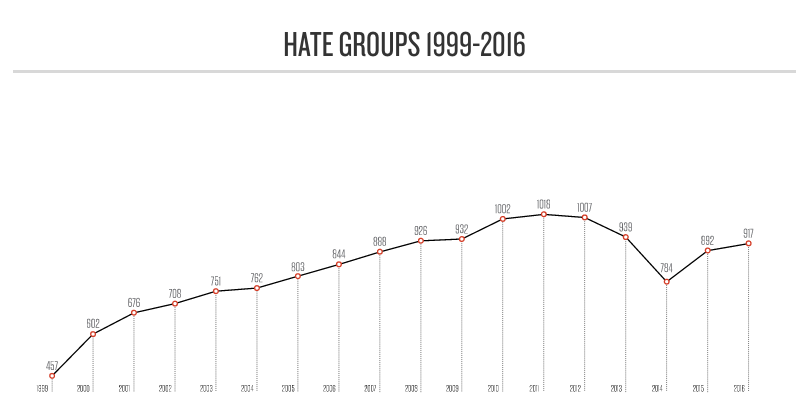How Hate Groups Spread in America in 2016

By:
UPDATE: Hundreds of white nationalists and counter protesters brawled in the streets of Charlottesville, Virginia, on Saturday—a day that culminated in an apparent act of domestic terrorism when a 20-year-old man plowed his car into pedestrians, killing one person and injuring 19 others.
The grotesque display of racism elicited widespread condemnation, though noticeably absent from the White House response was a specific denouncement of white supremacy itself. Many of President Donald Trump's critics have attributed the public insurgence of groups behind Saturday's protests on his extreme, racially tinged rhetoric, which experts say has emboldened hate groups in the United States.
In February, the Southern Poverty Law Center (SPLC) released its annual report on active hate groups in the U.S., painting a picture of rising hate in the country, especially against Muslims.
Overall, the number of active hate groups increased from 892 in 2015 to 917 in 2016, the report found.
 SPLC - splcenter.org
SPLC - splcenter.org
SPLC determined that the number of anti-Muslim hate groups tripled from 34 to 101 in the span of one year. Though hate groups don't necessarily engage in prosecutable hate crimes, their rise coincides with FBI data showing a 67 percent spike in hate crimes against Muslims in 2015.
.jpg?auto=format&crop=faces&fit=crop&q=60&w=736&ixlib=js-1.1.0) SPLC - splcenter.org
SPLC - splcenter.org
"I think it is very largely attributable to Donald Trump and his campaign," Mark Potok, an expert in extremism at the SPLC, told ATTN:. "I'm not saying it was 100 percent attributable to Trump because, at the same time, we had ISIS running around carrying out massacres, beheading people in the desert — and then since then, of course, other things have happened like the Orlando mass murder."
Still, "You are already seeing in the FBI numbers for 2015 the effects of the Trump campaign," he added.
 AP/Olivier Douliery - apimages.com
AP/Olivier Douliery - apimages.com
How does the SPLC determine what constitutes a hate group?
It's about ideology, Potok said. The SPLC looks at a group and if it "says that an entire group of human beings is somehow less by virtue of their class characteristics, that's it — that's a hate group for us."
The organizations then works to verify that there are multiple members — rather than just one person with a website, for example — and that they were active on the ground during the calendar year.
"This is all part of an effort to make the list mean something," Potok said.
UPDATE 8/13/2017 2:04 p.m. PST: This story has been updated to include details about hate group activity in Charolettesville, Virginia.
